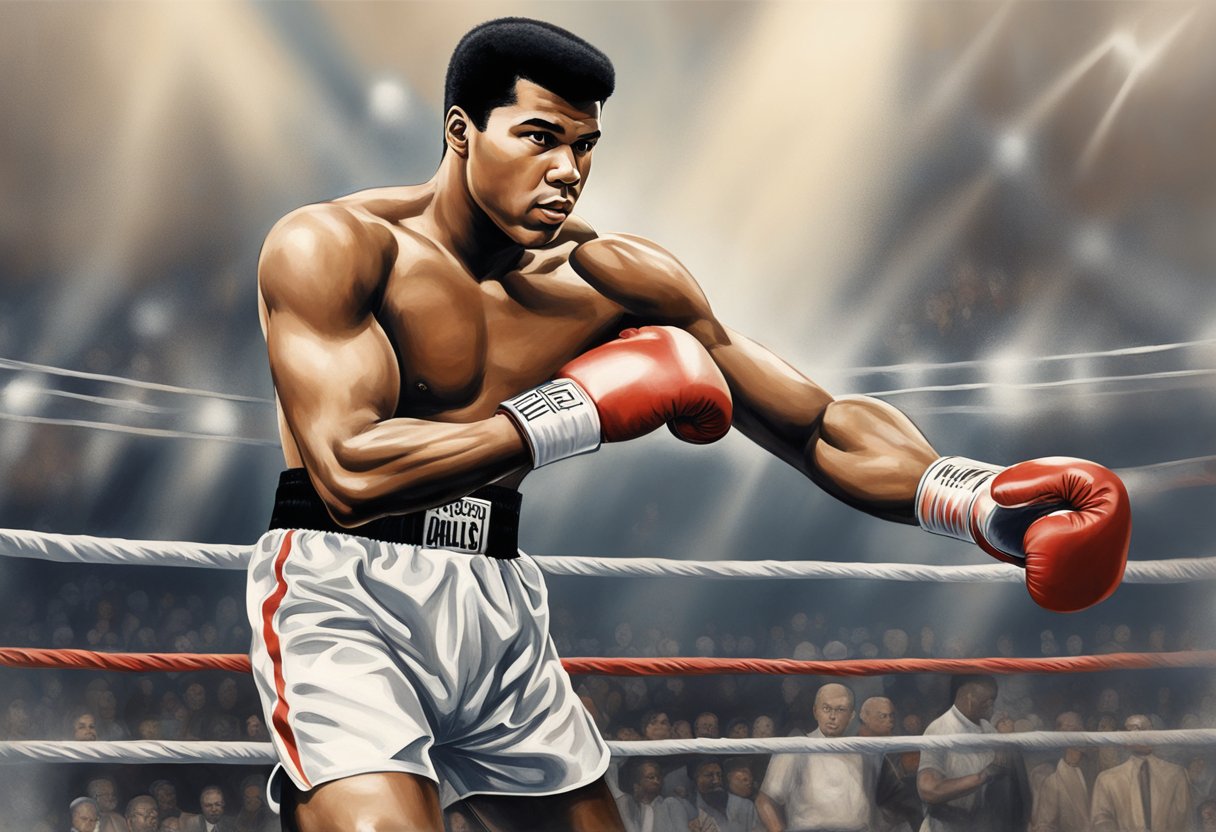
Muhammad Ali Impact on Society: Unraveling His Timeless Legacy
Early Life and Boxing Beginnings
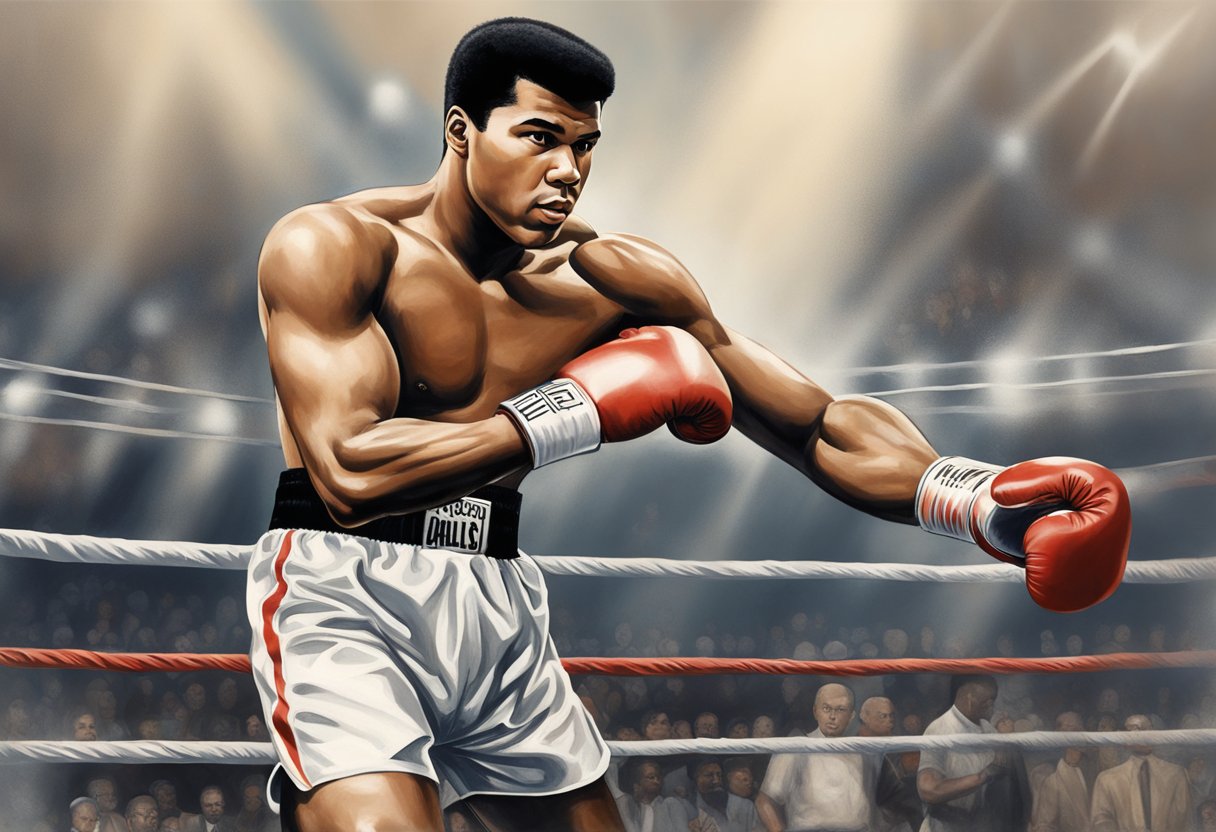
Discovery and Early Career
Muhammad Ali, born as Cassius Marcellus Clay Jr. on January 17, 1942, in Louisville, Kentucky, was the elder son of Cassius Marcellus Clay Sr. and Odessa Grady Clay. Raised in a modest household, Ali's journey to become a boxing legend began when his bicycle was stolen at the age of 12. He reported the theft to a local police officer, Joe Martin, who happened to be a boxing trainer as well. Martin saw potential in young Clay and began to mentor him in the world of boxing.
Ali's natural talent, combined with his dedication and incredible hand-speed, made him stand out from other amateur boxers. He held an impressive record of 100 wins and 5 losses as an amateur, which showcased his immense skill in the ring. During this time, Ali reached a pivotal point in his life—his entrance into the 1960 Rome Olympics.
Olympic Gold and Rise to Fame
Ali's boxing prowess earned him a spot on the U.S. Olympic boxing team. He competed in the light-heavyweight category, facing strong opponents from around the world. The young prodigy claimed victory after victory, finally winning the gold medal in boxing and captivating the world with his stunning performance.
Following his Olympic triumph, Clay turned professional, beginning a new chapter in his career. The 6'3" young boxer with a remarkable 78-inch reach was now on his way to etching his name in boxing history as Muhammad Ali.
Not only did Ali redefine the world of boxing through his sportsmanship, technical brilliance, and poetic trash talk, but he also used his fame as a platform to inspire and evoke change in society. His impact transcended the ring, and his legacy continues to live on as a symbol of courage, conviction, and change.
Conversion to Islam and Name Change
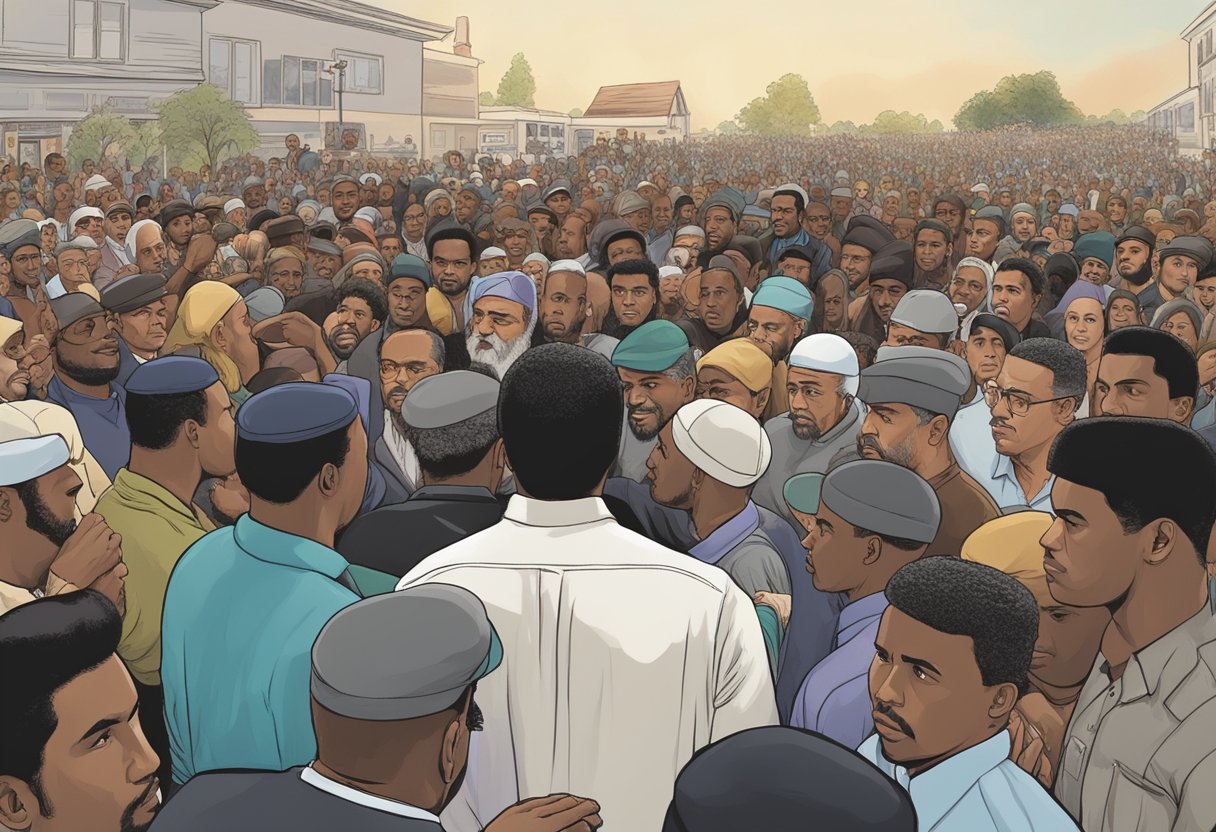
Muhammad Ali, born Cassius Clay, made a significant impact on society when he converted to Islam and changed his name in 1964. The conversion journey began with the influence of the Nation of Islam and deepened through his relationship with Malcolm X.
Influence of Nation of Islam
Muhammad Ali first encountered the Nation of Islam in 1960 during a visit to a Temple Mosque in Miami. He became captivated by the movement's teachings, which combined Islamic beliefs with a focus on African American empowerment and self-reliance. Under the leadership of Elijah Muhammad, the Nation of Islam called for "full and complete freedom," "equal membership in society," and "separate schools" for African Americans.
Ali's conversion to Islam represented a rejection of societal norms and his assertion of his personal beliefs. This decision fueled his critics, and the change from Cassius Clay to Muhammad Ali demonstrated the boxer's commitment to his new faith.
Relationship with Malcolm X
Malcolm X played a pivotal role in Muhammad Ali's journey as a Muslim. Their friendship began when they met in 1962 and grew stronger in the following years as the civil rights activist provided guidance to the young boxer during his spiritual journey.
Their relationship influenced Ali's perspectives on race and religion in America. However, the friendship faced a turning point when Malcolm X left the Nation of Islam and embraced Sunni Islam in 1964, leading to a distance between the two icons. Despite the separation, Malcolm X's influence persisted in Muhammad Ali's life as he continued to advocate for racial equality and social justice.
Muhammad Ali's conversion to Islam and his name change became symbolic of his beliefs and his desire to connect with a larger cause. The impact of his conversion extended far beyond the boxing ring, as it helped raise awareness and understanding of Islam in America and inspired many to challenge social norms.
Championship Fights and Rivalries
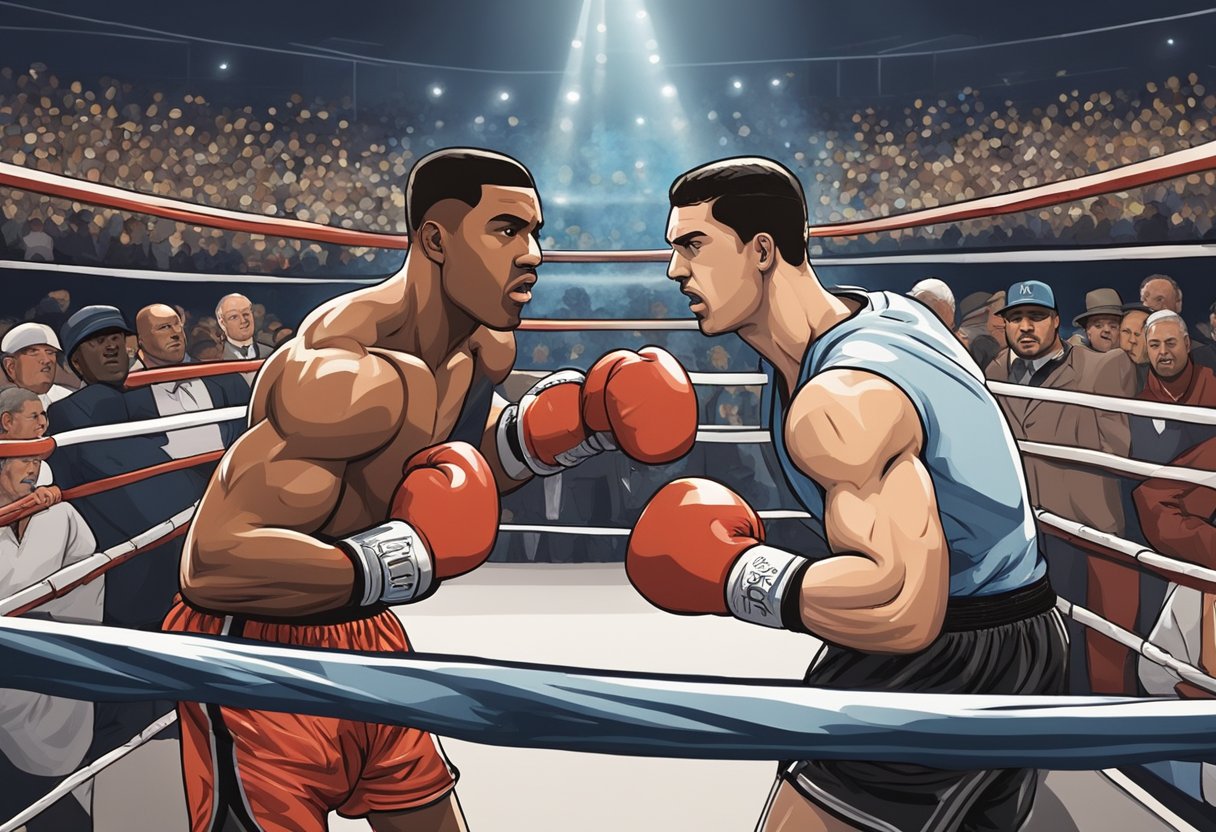
Fight of the Century
In 1971, Muhammad Ali faced his fiercest rival, Joe Frazier, for the first time in what was dubbed the "Fight of the Century." Both fighters were undefeated, and the world eagerly anticipated the showdown. Held at Madison Square Garden, this fight captured the attention of millions around the globe. It was a grueling, hard-fought contest that went a full 15 rounds. In the end, Frazier emerged victorious, handing Ali his first professional loss.
Rumble in the Jungle
Ali took on reigning heavyweight champion George Foreman in 1974, in a bout known as the "Rumble in the Jungle." Held in Kinshasa, Zaire (now Democratic Republic of Congo), this epic fight showcased Ali's tactical genius. He employed a tactic called the "rope-a-dope," in which he allowed Foreman to exhaust himself with powerful but ineffective blows, while Ali leaned back against the ropes to conserve energy. As Foreman tired, Ali pounced, knocking him out in the eighth round to regain the heavyweight title.
| Round | Ali's Strategy |
|---|---|
| 1-4 | Rope-a-dope |
| 5-7 | Counterpunch |
| 8 | Knockout |
Thrilla in Manila
In 1975, the third and final bout between Ali and Joe Frazier took place. This clash, known as the "Thrilla in Manila," would go down in history as one of the most brutal and unforgettable encounters in the boxing world. Both fighters showcased relentless determination and enormous heart. Ali, predicting the ferocity of the fight, famously declared, "It will be a killa, and a thrilla, and a chilla, when I get the Gorilla in Manila." The fighters battled for 14 grueling rounds before Frazier's corner decided to stop the fight, giving Ali the victory.
In these iconic battles, Muhammad Ali faced formidable opponents like Joe Frazier and George Foreman. His resilience, tactics, and charisma captured the hearts and minds of millions of fans around the world. His contributions to the sport of boxing and his impact on society continue to be celebrated and admired to this day.
Stand Against the Vietnam War
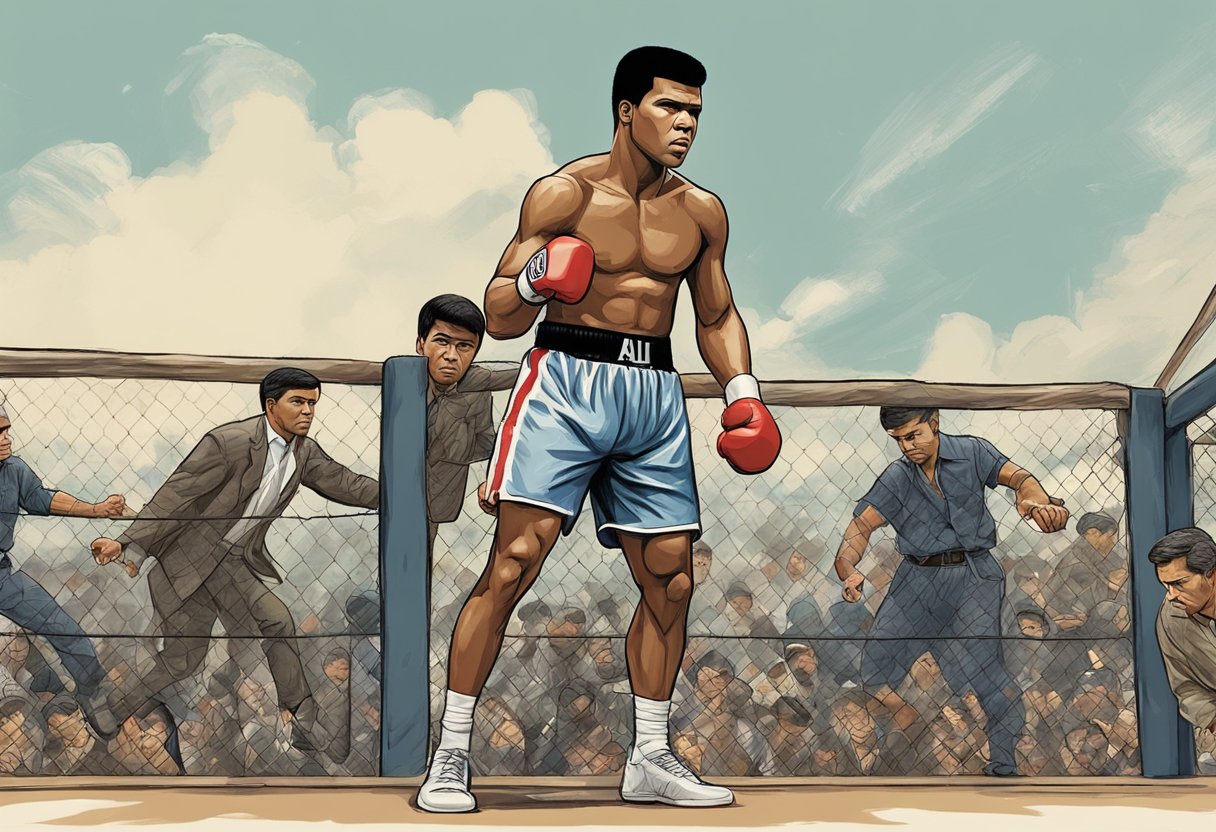
Conscientious Objector Status
Muhammad Ali, a world-renowned heavyweight boxing champion, became a prominent figure due to his strong opposition to the Vietnam War. In 1966, Ali was drafted by the United States military and called up for induction in 1967. He attended the induction but refused to answer to his name or take the oath, citing his faith and membership in the Nation of Islam as the reasons for his objection. This decision led to him being classified as a conscientious objector, which means someone who opposes war on moral or religious grounds and refuses to provide military service as a result.
Ali's refraining from military service in the Vietnam War marked one of the first instances of a highly famous public figure taking a stand against the conflict. At the time, public support for the Vietnam War was relatively high, with approval ratings over 50 percent during the first three months of 1966, according to Gallup.
Legal Challenges and Public Opinion
Ali faced significant legal challenges and public backlash during his opposition to the Vietnam War. After refusing to serve in the military, he was arrested and subsequently convicted of draft evasion. This conviction resulted in Ali being sentenced to five years in prison and fined $10,000 (approximately £7,000). However, he remained free while appealing the decision.
Beyond the legal consequences, Ali was also stripped of his heavyweight title and faced a significant decline in public opinion. His boxing career came to a temporary halt, and his income dropped considerably. But despite these challenges, he remained steadfast in his anti-war convictions.
In 1971, after years of legal battles, the Supreme Court unanimously overturned Ali's conviction. The court recognized that his refusal to serve in the military was based on his religious beliefs, and therefore, should not have been subject to punishment. This decision not only vindicated Ali but also served as a precedent for future conscientious objectors.
Muhammad Ali's firm stance against the Vietnam War, despite the personal and professional repercussions, had a lasting impact on society. His courage to stand up for his beliefs, even when facing adversity, continues to inspire people and remains a testament to his influence and legacy.
Impact on Civil Rights and Human Rights
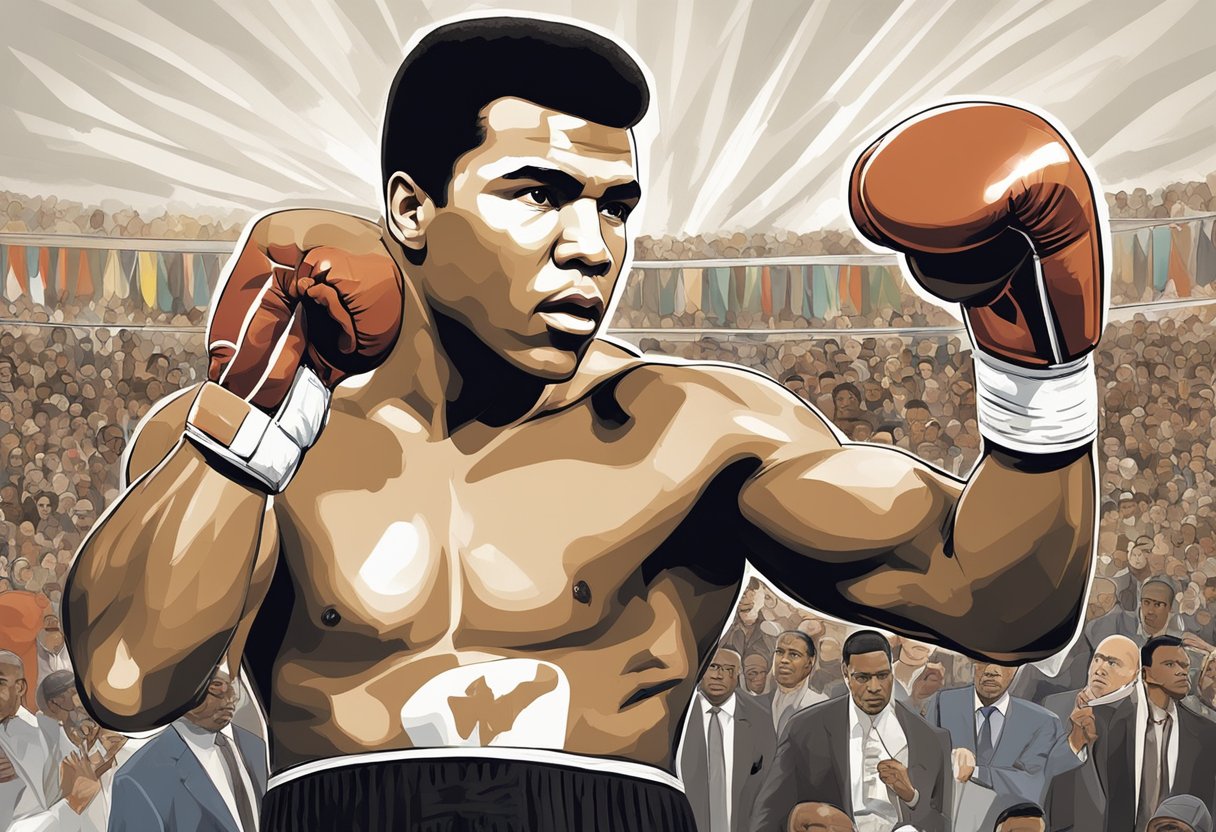
Ali and the Civil Rights Movement
Muhammad Ali was a powerful voice in the Civil Rights Movement, using his status as a world champion boxer to break barriers and promote social justice. Ali's career began during a time when racial tensions in the United States were high, and he used his platform to raise awareness and challenge discriminatory practices.
Ali's conversion to Islam influenced his Civil Rights activism. He aligned himself with other black leaders, such as Malcolm X, and became a prominent figure in the Nation of Islam. His public refusal to serve in the Vietnam War, due to religious and political beliefs, garnered widespread support and opposition. Ali resisted serving in a war that he felt served only white interests, leading to the suspension of his boxing license and convictions, which were later overturned in 1971.
Here are some notable moments from Ali's life related to civil rights:
- 1960: Wins Olympic gold medal and experiences racism upon returning home.
- 1964: Conversion to Islam and name change.
- 1967: Refusal to serve in the Vietnam War.
- 1971: His convictions are overturned by the Supreme Court.
Global Humanitarian Efforts
In addition to his impact on civil rights, Muhammad Ali was known for his humanitarian work. He tirelessly used his influence to help those in need and promote peace. Ali's humanitarian efforts can be seen in his work in developing countries, as a United Nations Messenger of Peace, and through his extensive charity work.
Some of Ali's humanitarian accomplishments are:
- 1990: Helps secure the release of 15 American hostages from Iraq.
- 1998: Appointed as a United Nations Messenger of Peace.
- 2000s: Continued work with his foundation to further educational and health initiatives.
Muhammad Ali's Reach Today
Despite his passing in 2016, Muhammad Ali's impact on society can still be felt today. His courageous stance in the Civil Rights Movement continues to inspire modern activists in their fight for racial justice and human rights. Ali's humanitarian work has left a lasting legacy as well, further solidifying him as a global icon.
Career Highs and Lows
Notable Victories and Defeats
Muhammad Ali's career was filled with many memorable fights. Among these, The Fight of the Century marked a significant moment in Ali's career, in which he faced Joe Frazier for the first time on March 8, 1971. In a closely contested match, Frazier handed Ali his first professional defeat by unanimous decision. The two would face off against each other twice more, and Ali emerged victorious in both encounters.
Another significant challenger was Ken Norton, who handed Ali a shocking defeat on March 31, 1973. Norton broke Ali's jaw early in the fight, but Ali still managed to last for all 12 rounds, losing by unanimous decision. Ali would later avenge this defeat in a controversial split decision win in their rematch on September 10, 1973, and again in their third meeting on September 28, 1976.
Ali's famous "Rumble in the Jungle" fight against George Foreman on October 30, 1974, demonstrated Ali's resilience and tactical genius. Ali used the "rope-a-dope" strategy to tire out Foreman, eventually knocking him out in the eighth round to regain the heavyweight title.
Comebacks and Retirement
As Ali's career progressed, comeback attempts were overshadowed by eventual decline. On February 15, 1978, Ali faced Leon Spinks, an inexperienced fighter with only seven prior professional bouts. Despite his underdog status, Spinks won the fight in a split decision. Ali would reclaim his title in a rematch, becoming the first fighter to win the heavyweight championship three times.
However, following his victory over Spinks, Ali was unable to maintain his success. He lost his championship to Larry Holmes in a largely one-sided TKO loss on October 2, 1980. Despite the setback, Ali decided to fight one more time.
On December 11, 1981, Ali faced Trevor Berbick in his final professional fight. Unfortunately, Ali's career would not end on a high note, as he lost by unanimous decision. Shortly after, Ali announced his retirement from boxing at the age of 39.
Throughout his career, Ali's tenacity, charisma, and boxing prowess captured the attention of the world. His notable victories and comebacks painted a vivid portrait of a man who constantly sought to defy expectations and test the limits of what was possible in the boxing ring.
Influences in Popular Culture
Representation in Media and Arts
Muhammad Ali's impact on society stretches far beyond his accomplishments in the boxing ring. His strong personality, charisma, and unwavering principles transcended sports, turning him into an influential figure in popular culture. One can witness the scope of his influence in numerous forms of media and arts.
Ali became a recurring subject in various artistic expressions. For instance, documentaries, movies, and TV series often featured his life and career, showcasing the depth and breadth of his influence. Furthermore, many masterpieces in music, literary works, and even art installations have been inspired by "The Greatest." His undeniable presence in the cultural realm influenced generations to come and contributed to his legendary status.
Iconic Phrases and Speaking Style
Muhammad Ali is remembered not only for his athletic abilities but also for his iconic phrases and unique speaking style. In a time when African-American athletes were expected to be restrained in their speech, Ali confidently embraced his linguistic prowess and became known for bold, poetic statements.
One of his most well-known phrases is, "Float like a butterfly, sting like a bee." This not only perfectly encapsulates Ali's boxing style but also exemplifies his signature captivating speech that captured the hearts and minds of people across the globe.
Another memorable Ali quote is, "I am the greatest, I said that even before I knew I was." This statement showcases Ali's unwavering self-confidence and his belief in forging one's destiny. Such inspirational and empowering words left a lasting impact on society and future generations, solidifying his place as a cultural icon.
In conclusion, Muhammad Ali's impact on popular culture is multifaceted and far-reaching. From his representation in media and arts to his iconic phrases and unique speaking style, "The Greatest" left an indelible mark on society. As a charismatic, confident, and influential figure, Ali has undoubtedly transcended the world of sports and become a symbol of empowerment and inspiration for generations to come.
Ali's Personal Life
Marriages and Family
Muhammad Ali was married four times and had nine children, including seven daughters and two sons. His first marriage was to Sonji Roi in 1964, but they divorced within a year. Ali then married Belinda Boyd in 1967, and together they had four children: Maryum, Jamillah, Rasheda, and Muhammad Ali Jr. The couple divorced in 1977.
Ali's third marriage was to Veronica Porsche, with whom he had two daughters, Hana and Laila. Laila would go on to become a successful professional boxer like her father. Ali and Veronica divorced in 1986. Finally, Ali married Yolanda "Lonnie" Williams in 1986, and they remained married until his death in 2016. They had one son together, Asaad Amin.
Ali was a dedicated family man who was deeply involved in his children's lives. Despite his fame and busy schedule, he made time to support and encourage his children in their endeavors, instilling the values of confidence, dedication, and respect in them.
Life Outside the Ring
Outside of his extraordinary boxing career, Ali was known for his strong political views, humanitarian efforts, and unwavering commitment to social justice. A convert to Islam, Ali was an outspoken advocate for African American rights and tirelessly worked to promote racial equality.
His refusal to be drafted into the US military during the Vietnam War led to a temporary ban from boxing and cost him titles, but it only strengthened his standing as a symbol of resistance for many. He was highly regarded for his dedication to charitable causes, raising millions of dollars for various organizations throughout his life.
Not only was Ali a supremely talented athlete, but he also used his platform to bring attention to various social issues. As a result, Ali's impact extended far beyond the boxing ring and left an indelible mark on society as a whole.
In 1984, Ali was diagnosed with Parkinson's disease. Despite his diagnosis, he continued to be involved in charitable activities and maintained his commitment to social justice. Ali passed away on June 3, 2016, leaving behind a legacy as one of the most influential sports figures and humanitarians in history.
